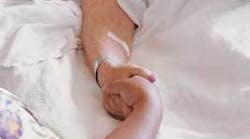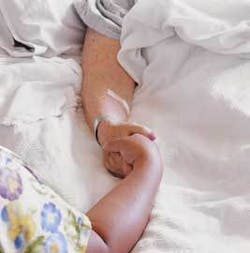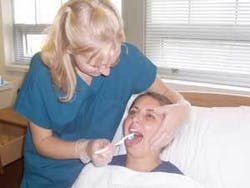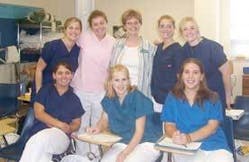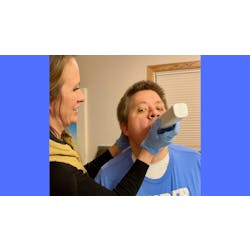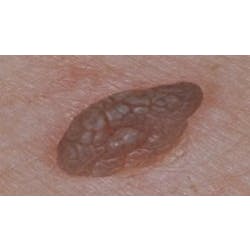Certified nursing assistants provide care to the elderly in nursing homes. But they don’t know all they need to know about oral care and its implications on systemic health. Through education, dental hygienists can help CNAs develop the skills they need to fulfill their calling to care for dependent adults.
In today’s society, many measures are taken to keep a child healthy and prevent disease. The child grows and goes through life getting preventive physical checks, visiting the dentist regularly, learning about good eating habits, and being instructed to avoid smoking and say “no” to alcohol and drugs. When the child reaches adulthood, parents, teachers, and family members hope the child has been given all the tools needed to maintain a healthy lifestyle as he or she ages. This is the relationship between growth and health as people hope it transpires in the year 2006.
For the last two generations, numerous organizations have focused on keeping the teeth of young children healthy and cavity-free. Many programs have been designed to benefit the oral health of young children, such as Colgate’s Bright Smiles, Bright Futures Campaign. Sealant programs are offered to underprivileged school-age children. Children are taught the importance of oral care in school. This population is looked after because they are dependent upon others to help them achieve a healthy oral environment as well as a healthy body. Hopefully children who are growing up now will be healthier than people who were born at an earlier time, specifically the early 1920s through the late 1950s.
While organizations are focusing on children’s oral health, another group of dependent people are failing in oral health - the dependent adult population.
The current dependent adult population was not raised during a time when prevention was of utmost importance. As a result, they suffer from many health issues that, with proper education, may have been preventable. The process of aging, in and of itself, presents many health challenges. Add these two issues together - not enough education and aging bodies - and the result is adult individuals relying on others to take care of them because they are no longer able to care for themselves.
As humans age many changes take place both physically and cognitively. This is the point in life when people may become dependent on care provided by an institution specifically designed to care for the elderly, namely the nursing home. Physical changes that make it difficult for the elderly population to care for themselves include changes in sensory functions. The ability to see, hear, touch, taste, and smell has a profound influence on interactions with social and physical environments.1 As sensory functions fail, living alone becomes difficult. For example, personal care is a challenge if an individual can no longer see. The aged person needs to be able to prepare meals, bathe, and accomplish daily housecleaning chores if he/she is going to be able to live independently.
Cognitive functioning - that is, intelligence, learning, and memory - is one of the most important and studied aspects of aging.1 These are critical to an individual’s performance in every aspect of life including work and leisure activities, social relationships, and productive roles.1 As aging adults begin to experience these changes, it can be difficult to manage the demands of their environment. If one is not able to remember important issues, such as if there is a pan on the stove, the environment may become unsafe. When the environment of an elder becomes unsafe, family members are forced to decide whether or not their loved one is able to continue living in their own home.
Upon an elder’s entry into a nursing home, certified nursing assistants are the primary care providers. Certified nursing assistants have been through approximately 120 hours of training on how to meet the needs of elderly clients. This education includes instruction in tasks such as:
• Proper hand washing
• Transferring clients from bed to wheelchair
• Assisting clients to ambulate
• Assisting with bed pan use
• Providing perineal care
• Accurately recording vital signs
• Providing catheter care and many more tasks2
After this relatively short training period, newly certified nursing assistants (CNAs) are placed on the floor in the nursing facility and expected to care for all the needs of the dependent adult resident. Many of the tasks carried out by CNAs are performed at a high level of competency, while others are lacking. One area of major concern is that of oral care. It has been reported that oral care of the institutionalized elderly is substandard. Reasons for this substandard care are numerous.
Due to the recent publication of research findings, oral health has become a topic of great importance. Oral health is linked to many overall health problems. These problems have been known to dentistry for many years. However, it has just been within the last few years that these links have begun to be recognized by the medical community. Some of the systemic diseases to which oral infections are linked include cardiovascular disease, stroke, adult onset diabetes, chronic obstructive pulmonary disease, arthritis, and Alzheimer’s disease. Several studies have concentrated on the correlation between poor oral health and cardiovascular disease. In an early case-control study, Mattila and colleagues reported that poor oral health was a predictor of myocardial infarction (MI) or stroke. Investigators found that individuals with evidence of oral infections were 30 percent more likely to present with MI than subjects without oral infections.3 A cross-sectional analysis of 1,342 dental patients conducted by Emrich and colleagues demonstrated that patients with diabetes are three times more likely to present with inflammatory periodontal disease.3 On May 25, 2000, the U.S. Surgeon General published a report titled, “Oral Health in America.” The Surgeon General confirmed that poor oral health has a direct correlation with chronic infections.4 In the report, Dr. Donna Shalala states, “The terms ‘oral health’ and ‘general health’ should not be interpreted as separate entities. Oral health is essential to general health, and the mouth reflects the status of general health.”4 With this evidence in current research and these comments being made by the former Surgeon General, it is apparent that poor oral health can affect overall health. Many people are able to care for their own daily oral health needs, but the dependent adult population often is not able to carry out effective, daily oral-care procedures. However, by providing adequate assistance in daily hygiene protocols, this population can experience better oral health, which may result in better general health. Improved health can greatly improve the quality of life for dependent adults.
This author sees many problems with this issue and I feel I have some solutions to assist the elderly in obtaining adequate oral health care.
Problem 1...
Barriers to oral care for institutionalized dependent adults
The largest barrier to care for institutionalized dependent adults is that dental hygienists are not permitted to provide preventive dental care for this population in the facility, unless certain conditions are met. This is due to restrictions put on dental hygienists by state legislation. Currently, in the state of Wisconsin, a dental hygienist may practice dental hygiene or perform remedial procedures only as authorized by a dentist who is present in the facility in which those practices or procedures are performed, except as provided in Para (c), which states:
1. The dental hygiene practices or remediable procedures are performed under a written or oral prescription from the dentist.
2. The dentist who made the oral or written prescription has examined the patient at least once during the 12-month period immediately preceding:
a. the date on which the written or oral prescription was made; and
b. the date on which the dental hygiene practices or remediable procedures are performed.
3. The written or oral prescription specifies the practices or procedures that the dental hygienist may perform with informed consent of the patient or if applicable, the patient’s parent or legal guardian.
4. If the practices or procedures are performed in a dental office, the patient has been the dentist’s patient of record for not less than six months.5
These conditions are difficult to achieve, because dentists are not providing in-house care to the institutionalized dependent adult client. Dentists have many reasons for not wanting to practice in a nursing home environment. These reasons include little reimbursement for services, the client base is a difficult group to work with, and dental equipment is not available in facilities. Medicare/Medicaid does not have a monetary provision for dental treatment. In a study conducted by MacEntee, Thorne, and Kazanjian, data was collected from 109 open-ended interviews with administrators and staff at several nursing homes. Frustration was expressed by a dentist operating an on-site clinic on a fee-for-service basis. He was concerned with the amount of additional paperwork and time required of him by the facility’s administration. There was also frustration from the feeling that the usual and customary fees in the community did not allow for the fact that, “It takes longer to sit the resident in the chair, and it takes longer to get them out, and they have more needs, and they like to talk … You don’t make the same money compared to private practice.”6 As people age, they become more difficult to treat for many reasons:
• They have numerous medical and pharmacological issues that need to be considered prior to treatment.
• They are not as easy to position as a younger patient due to their aging bodies, and they can be difficult to communicate with due to dementia, hearing loss, etc.
• It takes more time to treat these patients and not all dental professionals are up to the challenge of dealing with this clientele on a daily basis.
A study completed by Chung, Mojon, and Budtz-Jorgensen7 reported that about 40 percent of surveyed facilities had a room that could serve as a dental office on-site. These rooms had no dental equipment in them, but could potentially be set up as a dental treatment room. The equipment needed to provide dental care is expensive and requires a fair amount of space, not to mention the need for compressed air and suction. Nursing homes typically do not have a budget to purchase dental equipment. As a result, a dentist who had a desire to work in such a facility would incur the financial burden of purchasing equipment.
Due to restrictions posed by current regulations, if a nursing home resident needs or wants to see a dentist or dental hygienist for oral care, the resident must be taken to a traditional dental office. It is very difficult to get residents to dental appointments. A director of a nursing home complained “to take residents out, especially if they are demented, is really very, very difficult … getting them out of the facility, even getting them into the car, taking them to somebody they don’t know … compounds their anxiety and their dementia.”6 Agitation may also accompany dementia; elders may display irritable behavior, pacing, restlessness, and general expressions of distress. These behaviors are not a normal outcome of dementia, but are triggered by environmental changes, fear, fatigue, and loss of control.1 Based on information such as this, it is easy to understand that keeping a resident with dementia stable is perceived as more important than having them receive off-site dental care.
The facility also incurs a cost when transporting residents to outside locations. A staff member needs to be paid to drive the vehicle and stay while the resident is at the appointment. The cost of maintaining a vehicle to provide transportation for residents is a cost many facilities cannot support. Currently, the cost of fuel for the vehicles is a major concern as well. Some facilities provide toothbrushes, toothpaste, and other oral care products for the residents - a cost built into the general operating budget - while others leave this responsibility to the residents and their families.6 If some facilities cannot supply oral care products, transportation of residents is more than likely out of the financial capabilities of the facility.
Solution 1 ...
Allow dental hygienists to practice in nursing home settings.
If the scope of practice restrictions were lifted by legislators, dental hygienists would have the freedom to provide care to this population of underserved people. Legislators need to understand that dental hygienists are well educated and very qualified to provide treatment without being directly overseen by a dentist. It appears dentists are more interested in keeping dental hygienists under their supervision than they are in providing needed dental hygiene services to all people. Dental hygienists should be bombarding legislators with current research information that discusses how important dental care is to the elderly and that prevention pays. If legislators are made aware of these issues, they may be more likely to change current regulations. Current legislation is not giving dental hygienists who are interested in this population an opportunity to treat them. Dental hygienists would provide excellent service to this population because they are excellent clinicians, due to their extensive training which has focused exclusively on preventing disease. In addition to being well educated in this field, there also is a strong humanistic aspect to many dental hygienists. Many dental hygienists enjoy treating the underserved. Dental hygienists do not require the same level of compensation as dentists do. There is a psychological pay-off for them which is just as important as the monetary pay-off. These are just a few of the reasons dental hygienists would be good candidates to provide services to this population. Hygienists believe in the work they do and they understand how important professional hygiene services are to quality of life. This belief and understanding helps the dental hygienist continue on with efforts to change the current system in hopes of improving the issue of oral care for dependent adults.
The dental hygiene profession needs to be providing education to the public so they understand what the oral care issues are and how poor oral health can affect their general health. If people see how important oral care is they may take better care of their mouths, which may result in better general health, and possibly less need for nursing home care. Another way public education may pay off is that if family members understand their loved one’s quality of life can improve with adequate dental hygiene services, they may be inclined to look for the availability of this service when considering nursing home options for loved ones. Public awareness can be heightened by making oral care issues visible in newspapers, magazines, television commercials, etc. Heightened awareness may get people interested in taking a proactive approach to oral care. If the general population were well educated on the issues, they may be apt to contact their government representatives, and ask that current restrictions to oral care be lifted.
Nursing home staff supports having in-house dental care. When discussing professional dental care for residents, 65 percent of surveyed facilities were in favor of having a dentist responsible for the facility, and of equipping the facility with a portable dental unit.7 They felt if a dental team were on staff, oral care would increase. The dental team would be visible in the facility and provide a constant reminder that oral care is vitally important. Dental professionals would also be available to address any oral care concerns that may arise.
Solution 2 ...
Get dentists interested in this population, so they will decide to work in these environments. If dentists were already in the facility, dental hygienists would be able to perform needed hygiene services.
To achieve this solution, dentists would need to be compensated enough to make a living for themselves similar to that provided by a private practice. Equipment needs to be up-to-date to allow for the delivery of quality dentistry and be ergonomically sound for practitioners. All of these things could be achieved by educating nursing home administrators in the area of oral health care. Currently, nursing homes evaluate oral health of residents based upon three areas:
• Is the resident eating well?
• Is there a lot of blood when brushing?
• Is the resident complaining of mouth pain?
These are not adequate ways to access oral health, but these are the criteria staff members know to use in determining oral health status. If administrators were seeing up-to-date oral care information in their journals - for example, McKnight’s Long Term Care News, Provider, Advance, to name a few - they would understand the overall health benefits residents could reap just from effective oral care. If facilities were to conduct thorough assessments of residents once they understood the issues, they would be able to see that improvements in this area need to be made. Then they would understand the importance of having dental professionals on staff. Hospital associations are beginning to understand the magnitude of oral care and are beginning to put pressure on legislators to change laws so access to care can be better,8 but a more proactive approach needs to be taken on behalf of the dental hygiene profession.
Dental schools need to emphasize education in the area of geriatric dentistry. In 1982, Claus discussed the extent and nature of geriatric dentistry programs in dental education. She noted that only 10 percent of dental schools in 11 industrialized Western countries offered a course in geriatric dentistry. She concluded that, because of the limited curriculum time allotted to training in geriatrics, emphasis was given to the pathological process of aging rather than to the social, biological, emotional, political, and economic aspects.9 People hold many stereotypes about aged adults. If education about this population and their specific needs were taught to students (i.e., social, biological, emotional, etc.), more students would realize they enjoy working with this clientele. It is only through education and experience that stereotypes and negative attitudes toward elderly persons can be dispelled. In recent years, training in geriatric dentistry has received increased attention, although this seems to be a slowly developing process.9
Problem 2 ...
Certified nursing assistants do not have enough education in oral health to provide adequate oral care to dependent adults.
Certified nursing assistants are responsible for providing services to people in their care. One of their major services is oral care. Perhaps one of the greatest concerns for our frail and dependent elders is their poor oral hygiene. Impaired manual dexterity combined with cognitive deterioration makes it difficult for these residents to carry out oral self-care.7 Given the systemic complications that can be acquired due to poor oral care, it is important that caregivers are thoroughly educated in all aspects of oral health. Once all of the implications of oral care are understood, the likelihood of CNAs being diligent in providing oral care will increase.
Two certified nursing assistant programs in the Janesville, Wisc., area - Blackhawk Technical College and Madison Area Technical College - are run on a 120-clock-hour schedule (one month). Approximately half an hour is devoted to the instruction of oral care, followed by very limited time spent practicing the clinical aspects of this task. The hands-on experience they receive is done on classmates, who do not mimic the clientele students will be caring for in a nursing facility. The text used by these two CNA programs devotes one-and-a-half pages to the discussion of oral care and does not discuss the oral and systemic links that are strongly supported in current literature. Oral care is included in the personal hygiene chapter along with hair care and perineal care. It is important that oral hygiene not be placed in the same category as simply helping a resident with their hair or make-up. Instead, oral hygiene needs to be given a higher priority, equivalent to such disease prevention activities as turning a resident and ensuring adequate hydration.4 Instructive information, in the text, on how to actually perform oral care is very vague. In the two short paragraphs dedicated to oral care for a person with natural teeth, there is no discussion of how to accomplish oral care. In the State of Wisconsin Nurse’s Aide Candidate Handbook,2 there are 21 steps listed in providing oral care. Only step 10 discusses the actual cleaning of the teeth. It states, “Candidate cleans entire mouth (including tongue and all surfaces of teeth), using gentle motions.” If the CNA candidate does not perform this step correctly, they fail the oral care skill. This is an unfortunate consequence given the fact that not enough information is given to the candidate during their education to successfully complete this task. But failure is typically not an issue, because the actual cleanliness of the mouth is not inspected by testers. Testers watch the procedure and determine if it looks like an adequate job would be done by the way the candidate has performed toothbrushing.The authorbelieves that in order to achieve a thorough assessment of skill competency, oral cleanliness should be determined before and after the candidate has provided oral care on the mock resident.
The CNA text, Textbook for Nursing Assistants, a Humanistic Approach to Care Giving, copyright 2005, makes reference to issues that are out-of-date. “Poor oral hygiene can cause gingivitis (inflammation of the gums), which can lead to pyorrhea (gum disease).”10 The term pyorrhea has been out of the dental literature for half a century. In the text, Primary Preventive Dentistry, it states, “Throughout the first half of the 20th century, pyorrhea alveolaris and receding gums remained popular terms for periodontal disease by both professionals and lay persons.”11 It is now the 21st century and a new CNA text is still referring to disease of oral bone as pyorrhea. This outdated information should not be taught to CNA students in this day and age.
Another example of misinformation provided in the new text is the information regarding the use of dental floss. Brushing alone is not enough to remove food that lodges between the teeth, so flossing once a day is recommended as a part of good oral hygiene.10 In older patients, gingival recession is a common experience. Often the recession is so pronounced that the use of regular dental floss is not effective in cleaning the long expanse of exposed root structure.11 In addition to not being an effective way of cleaning root structures, flossing is a difficult task for CNAs. Many residents do not even cooperate with daily toothbrushing procedures, so how can the CNA be expected to perform flossing? There are other options available for cleaning these areas of the mouth that are easier. There is no mention of these options in the CNA text.
Solution 1 ...
Provide students in certified nursing assistant programs with up-to-date information in the area of oral care.
There are two major ways to ensure that newly graduated CNAs have the most up-to-date information possible concerning oral care. The first avenue to consider is to incorporate up-to-date, cutting-edge information into the textbooks used by these programs. Textbook authors need to be contacted and informed that the information they are providing is out-of-date. The authors are typically highly educated registered nurses. Because they are not in the field of dentistry, they are not knowledgeable about current oral health issues. It is very easy to use information that was provided to them when they were in school. Because oral care is a very specialized field, dental professionals should be sought out to write the oral care section of CNA textbooks.
The second way to get up-to-date information for programs is to have dental professionals with current knowledge in this area provide the lecture on oral care in CNA programs. This would give students the opportunity to ask questions of a dental professional. The hygienist could also take part in the lab portion of the education. They would be able to offer hands-on tips on denture cleaning, interproximal cleaning, and effective plaque removal. The students could also be exposed to products that are available and use them firsthand on each other to see how they help achieve a clean oral environment.
Solution 2 ...
Oral health professionals provide mandatory oral care in-service.
In the state of Wisconsin, oral care in-service training is mandatory for all certified nursing assistants. During a phone survey (conducted by the author) of 35 nursing facilities in south central Wisconsin, respondents were asked who provided oral care in-service training sessions. The general consensus, among surveyed facilities, was that oral care training was provided by nursing staff or visiting hygienists/dentists who were not highly informed about the issues faced by residents of nursing homes and the challenges CNAs face when providing oral care. In many other states, there is no mandating of oral care training. In a study that collected cross-sectional data by means of three questionnaires, 169 staff members from 13 nursing homes were asked several questions. One of the questions was whether they had been given instruction in the area of oral care. A majority of the respondents had received no education in oral hygiene of the residents.7 If a professional who is knowledgeable about the oral health needs of this population would provide in-service training, staff would be more knowledgeable about the issues that face the people for whom they are caring. These professionals may also be able to motivate caregivers.
The current feelings about oral care among nursing staff and CNAs are an issue. Many CNAs report several concerns about providing oral care to residents. Individual items of concern include not enough time to provide adequate mouth care, the risk of being bitten by residents, resident cooperation, and myths about oral health in aging.12 The way CNAs value oral health may be applied to the dependent clients for whom care is being provided. If oral health has not been a concern for the individual CNA, then it is unlikely that oral health-care provisions for others will have a high priority.12 Training needs to provide information that is up-to-date and will motivate/excite the staff about oral care. Education should help caregivers understand the health improvements they can make simply by providing good oral care to residents. Another vital element of instruction is the inclusion of oral care information that improves CNA’s dental IQ and their perceptions of the value of oral health.
In addition to in-service training sessions held in-house, many facilities are looking to the Internet for education. On-line continuing-education programs and in-service training programs fall short in the area of oral health care. In the online courses the author has viewed, there was no mention that poor oral care can lead to periodontal disease and that periodontal disease can contribute to systemic diseases. Just as in the nursing assistant textbooks, the information provided in online courses is grouped with grooming. If oral care is not completed, it is looked at as an issue of being unclean, much in the same way as if hair is not washed. The image of oral care needs to be changed. It needs to be understood that poor oral health can contribute to other diseases such as heart disease, diabetes, COPD, etc. Unwashed hair is not going to affect a person the same way as an unclean mouth can. Oral health professionals should be writing the oral care portion of online continuing-education modules.
Analysis
Oral care of the dependent adult population is an issue that is poorly addressed, and education on this topic is lacking. It is an area where large improvements are needed, and if implemented could make a huge impact on the oral as well as systemic health of this population.
The best solution to this crisis is to place qualified oral care specialists, namely dental hygienists, in the nursing home setting, so they can provide the much-needed service of preventive oral health care. Care on this level would alleviate transportation costs, as well as issues of disrupting the normal daily routine of this fragile population. Costs to the resident and facility for emergency treatment would also be curbed because preventive care would be provided, and large dental problems would be avoided. Dental hygienists provide services at a much lower cost than dentists, which would result in lower salaries paid out. Dental hygienists do not require the same equipment and supplies as dentists, so the cost of setting up and operating a treatment room for a hygienist may be lower than for dentists. However, having witnessed the way in which issues are handled on the governmental level, it is not feasible to wait until current restrictions on the dental hygiene profession are lifted. These issues could take years, even decades, to change. Action needs to be taken now.
Just as changing legislation takes time, so would resurrecting a sector of dentists who would be willing to take this population’s care into their hands. Dentists are not willing to change their lifestyles by accepting lower pay to treat institutionalized adults. Dentists, like dental hygienists, are excellent clinicians, but they often lack the communication skills needed to address the special needs of this clientele. Dentists who are interested in the dependent adult population are few and far between, which is why this population is underserved.
The most logical, realistic, and attainable solution is education. If student CNAs as well as practicing CNAs were given the opportunity to receive adequate oral care training, they could make an immense difference in the oral and general health of the residents.
During this project, the author has been conducting research to test a hypothesis that if CNAs were given top-notch, up-to-date oral care information from a dental professional, they would feel more confident providing oral care. I have provided educational seminars to both nursing facilities and a technical college. At the completion of each training session, attendees were asked to complete a questionnaire. Results are based on 34 questionnaires. Responses were given from 1 to 5 with 1 being “do not agree at all” and 5 being “agree strongly.”
• The information given at the in-service training discussed things I was not aware of. (Mean score = 4.5)
• The information presented will help me provide better oral care for my residents. (Mean score = 4.7)
• I would recommend this training to others. (Mean score = 5.0)
Twenty-two CNA students were polled after their oral care training session. The format was the same as the working CNA’s evaluation form.
• The presentation discussed things I was not aware of. (Mean score = 4.1)
• The information presented will help me provide better oral care to my residents. (Mean score = 4.7)
• Do you feel more educated about oral care than you did after you read and studied your textbook? (Mean score = 5.0)
In addition to the scored responses, questions that required written responses were also asked of all attendees. The CNA instructor at Madison Area Technical College offered this comment, “A dental hygienist gives a professional emphasis to the topic. A new face also adds emphasis. Your enthusiasm is contagious.” A director of nursing at an area nursing facility had this to share, “I have been in this field for 30 years, and this is the best oral care in-service training we have ever received.”
There were many similar comments given from both students and working CNAs. Nurses have also attended some of the training sessions and they, too, have offered positive feedback. It has been suggested that the author consider training registered nurses as well as CNAs due to the fact that RNs are the direct supervisors of CNAs. It was thought if RNs had this knowledge, they could help ensure adequate oral care was being provided to the residents. While this research was not large-scale and was based only on attendee feedback, the author feels that the comments support my hypothesis.
The author has been in contact with the publisher of the text currently being used by Madison Area Technical College and Blackhawk Technical College. Attention has been brought to the author of the textbook that several of the terms and suggestions used in the oral care section are obsolete. The author was very interested in the comments made about the oral care section and has asked me to review the chapter for inclusion in the second edition of the text.
This reply is reinforcement to the idea that oral care specialists need to be submitting up-to-date information on oral care to textbook authors. Without this information, newly published textbooks will provide poor information to students. This poor information may result in the delivery of inadequate oral care, which, in turn, may result in other negative health issues for the dependent adult population.
Registered nurses and CNAs rely upon peer-reviewed journals and other publications to provide them with up-to-date research. Oral care specialists should consider writing articles for these publications in the same way they do for dental publications.
Getting information about oral care into these types of journals and professional publications would provide education to the people who are directly responsible for the care of the dependent elderly. Consequently, oral as well as systemic health would improve.
The bottom line solution for this issue, as with many health-care issues, is education. The definition of education includes, “To bring or guide the powers of ...; to develop and cultivate ...; to expand, strengthen ...; to prepare and make fit for any calling or business for systematic instruction; to train; to instruct.”13This definition encompasses all the aspects of education to be provided by a dental hygienist during oral care training.
The dental hygienist is knowledgeable enough to bring education to CNAs through training and instruction. The oral care professional would help guide the powers of CNAs in the area of oral care by helping cultivate the clinical skills needed to perform this task at a high level of competency. This training would expand and strengthen the CNAs’ vision of oral care, which would make them fit for their calling to provide overall excellent care to the dependent adult population.
References
1 Hooyman NR, Kiyak HA. Social gerontology. Boston: Pearson 2005.
2 State of Wisconsin. Nurse’s aide candidate handbook. [Brochure]. Philadelphia, Pa: Promisor 2005.
3 Paquette DW, Nichols T, Williams RC. Oral inflammation, CVD, and systemic disease. Connections 2005; 1 (Suppl. 1).
4 Kleiman C. Oral care: an integral part of residents’ care. CNA Today 2003; (3), 42-44.
5 Wisconsin Statutes and Administrative Code Relating to the Practice of Dentistry and Dental Hygiene 2003; ss 447.06.
6 MacEntee MI, Thorn S, Kazanjian A. Conflicting priorities: oral health in long-term care. Special care in dentistry 1999; (19), 164-172.
7 Chung JP, Mojon P, Budtz-Jorgensen E. Dental care of elderly in nursing homes: perceptions of managers, nurses, and physicians. Special care in dentistry 2000; (20), 12-17.
8 American Dental Hygienists Association. (n.d.). The future of oral health. Retrieved Sept. 15, 2005, from http://www.adha.org.
9 Cohen LK (Ed.), Gift HC (Ed.). Disease prevention and oral health promotion. Munksgaard, Copenhagen: Federation Dentaire International 1995.
10 Carter PJ, Lewsen S. Textbook for nursing assistants: a humanistic approach to caregiving. Philadelphia: Lippincott Williams and Wilkins 2005.
11 Harris NO, Garcia-Godoy F. Primary preventive dentistry. Upper Saddle River, N.J.: Pearson Prentice Hall 2004.
12 Plye MA, Nelson S, Sawyer DR. Nursing assistants’ opinions of oral health-care provision. Special care in dentistry 1999; (19), 112-117.
13 Brainy Dictionary. (n.d.). Retrieved Oct. 5, 2005, from http://www.brainydictionary.com/words/ed/education158399.html.
